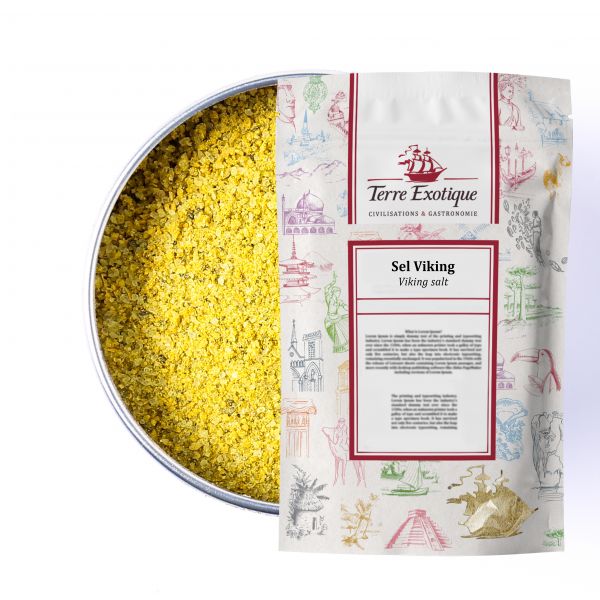





Where to use Viking Salt ?
The strong yet delicate
aromas of this Viking Salt are delicious with potatoes, boiled eggs and of
course salmon.
Viking Salt is ideal
for fish or chicken marinades or even tofu for vegetarians. Its smoked taste
will enhance the character of poultry and is perfect with other aromatic
herbs (thyme, rosemary…). Delicious for summer barbeques, to season your skewers,
peppers or pork and lamb chops.
How to get the best
from your Viking Salt
Our recipe ideas for
Viking Salt:
·
Home-made Viking Salt butter: add 2 to 5 grammes of Viking Salt to your
butter. Ideal spread on blinis with smoked salmon;
·
Viking Salt marinated fish: marinate your fish in the juice of 2
lemons with a few pinches of Viking Salt and a few sprigs of thyme for 4 to 5
hours, then grill on the barbeque;
·
Viking Salt marinated salmon: spread your salmon steaks with a mix of Viking
Salt and Savora mustard and leave to marinate in the fridge for 2 days;
·
Viking Salt fish crumble: at the end of the cooking process, sprinkle a
teaspoon of Viking Salt over your fish;
·
Steamed potatoes with Viking Salt: sprinkle 1 teaspoon of Viking Salt in
the water used to steam your potatoes then sprinkle a few pinches of Viking
Salt over your potatoes just before serving;
·
Viking Salt béchamel sauce: use Viking Salt instead of your usual salt
in your béchamel sauce for a spicy twist. Use this béchamel on your cauliflower
cheese or your croque-monsieur;
·
Viking Salt foie gras: sprinkle your foie gras canapés with a pinch of
Viking Salt.
Cheese soufflé with Viking
Salt
Ingredients
25cl milk;
20g cornflour;
3 eggs;
50g freshly grated cheese;
1 teaspoon Viking
Salt.
Method
Preheat your oven to
180°C.
Mix the cornflour with
5cl of milk.
Separate the egg
yolks from the whites and whip the egg whites until stiff. Put aside.
Bring the rest of
the milk to boil in a saucepan with the Viking Salt then add the cornflour mix.
Stir constantly until it forms a thick smooth sauce.
Remove the saucepan from
the heat and add 3 egg yolks and the grated cheese and mix thoroughly. Then
gradually fold in the egg whites.
Place in ramekin
dishes and cook in the oven for 30 minutes at 180°C.
Serve immediately!
Viking
Salt for connoisseurs of strong smoked flavours
Viking Salt - a real character
Viking Salt is an astounding salt
with its subtle mix of smoked salt and strong flavoured spices. Black pepper,
turmeric and grilled onions will enhance your dishes without scorching your
tastebuds. This smoked salt will dazzle your palate with its powerful aromas
bringing to mind Scandinavian forests and the salty North sea air.
Viking Salt’s fine texture
dissolves easily, and its extraordinary flavours will mingle deliciously with
all your dishes.
How is this smoked taste obtained?
Scandinavian cuisine is renowned
for its smoked flavours which are obtained using an age-old wood-smoking
technique for preserving meat and fish. This technique produces exceptionally
intense and heady tastes, releasing grilled or even barbequed, woody, salty
notes. Smoked foods and condiments, like Viking Salt, are delicious with red
meat, and sweet vegetables like carrots and sweet potatoes.
How is Terre Exotique’s Viking Salt made?
A carefully smoked salt
To obtain these
smoked fragrances, that instantly bring to mind a smouldering fire outside a
log cabin, the salt is first smoked for a long time, using a top secret
technique … When the taste and scent are just right, the mix of Viking spices
are added. Like an Indian curry, this mix of spices with strong aromas add
really surprising flavours to the smoked salt. Black pepper adds character,
turmeric gives a warm well-rounded taste and grilled onions add a sweet note…
All these flavours delightfully enhance the smoked salt.
Viking smoked salt, a legendary recipe
A recipe inspired by Scandinavian
flavours
Legend has it that Viking Salt is
one of the culinary heritages of the Viking warriors. Adventurous,
war-thirsty Vikings, set sail in search of riches on their drakkars to
conquer Europe, Russia, the Mediterranean and North America in the 10th
century! Out on the oceans for long periods of time, they were skilled hands
at preserving their food by smoking it. This love for smoked foods, typically
fish or game has remained with the Scandinavians ever since.
How did Vikings get to taste pepper and
curry so early on?
How is it that
Vikings used pepper and Indian spices (turmeric, cumin…), although the Spice
Route did not come about until later in the Middle Ages? Vikings were
pioneers and great explorers, and didn’t wait for others to determine their
route to discover other territories. As far back as 3rd century A.D., they
set up trading posts in many European and Central Asian towns. They traded
arms, ivory, amber and … spices!
| Allergen | Absence |
|---|---|
| Native country | ALLEMAGNE |
| Ingredients | salt (63%), black pepper, onion, smoke flavor, dextrose, turmeric, |
| flavor. | |
| Nutritional Info | VN Energie pour 100 g (energy for 100g) : 424 kJ / 101 kcal VN Matière grasse (fat) : 0.7 g Dont acide gras saturés (of which saturated fat) : 0.2 g VN Glucides (carbohydrate) : 20.8 g Dont sucres (of which sugars) : 19.5 g VN Protéines (protein) : 2.4 g Vn Sel (salt) : 63.53 g |
| TRACES EVENTUELLES D'ALLERGÈNES | céleri, sésame, moutarde, fruits à coques. |
 Français
Français 